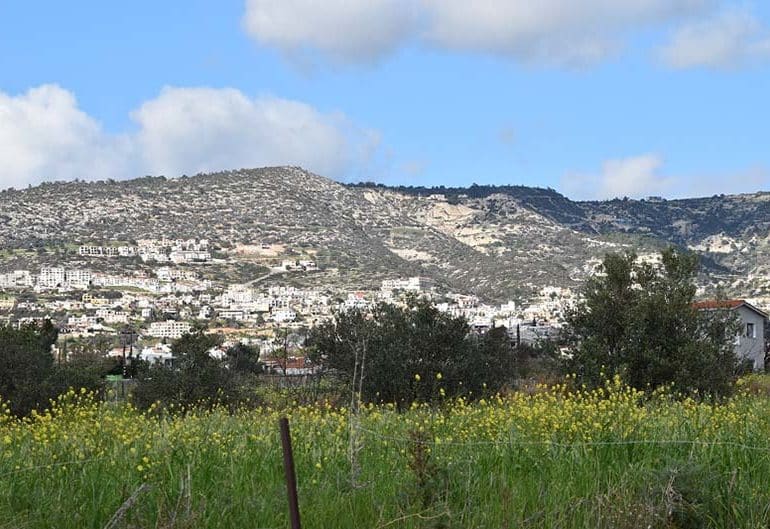Peyia is mulling what steps to take after losing a court case to block the development of a hillside above the Paphos town.
The local municipality had challenged the government’s decision to issue a planning permit for a massive development at Ayia Vouni (Sacred Mountain), a hillside that overlooks Peyia, saying that it would irreversibly damage the environment, put pressure on infrastructure and create new homes whilst thousands remain empty.
“We are looking into a possible appeal. We have 42 days from December 14, 2020, when the ruling was made, and I can’t believe the outcome,” Peyia councillor, Linda Leblanc told the Cyprus Mail.
“I didn’t see what papers were submitted by Peyia or what documents were given to the lawyer, but in my opinion it should not have been dismissed by the judge as there is ample evidence on the two main points that are required.”
Planning permission for the project was granted on July 28.
Although the project is being pitched as green and sustainable, Leblanc points out that it will be built next to the protected Pikni forest and a small part will also fall within the Natura 2000 network.
The development was proposed after changes were introduced to building policy in 2014, concerning the promotion, regulation and control of a new type of development in the countryside which aims to provide increased building efficiency.
The project’s developer is former president George Vassiliou who acquired around 330,000m2 in Peyia. The design, described as a ‘sustainable development project and a near zero energy settlement’, is receiving funding from the EU as part of its zero-energy initiative.
Leblanc explained that by law, Peyia had to demonstrate two points to halt the project, public interest and specific damages issues.
“The judge basically said, the government has said it’s all OK and there is not specific or sufficient evidence to support your case and it is dismissed.”
As part of studies undertaken for a masterplan of Peyia, the geology department have recently found issues of stability in a number of areas in Peyia, including the entire coast, the hills above the town, which includes the site of the proposed development, and other areas in between, she said.
“There is ample evidence to show that this huge development should not go ahead. It could destabilise the area and affect the centre of the town. There are also huge problems here when there is torrential rain.”
Klitos Papastylianou of the ‘initiative for the natural coastline and commons of Cyprus’, previously stated that the development should not go ahead as it failed to meet almost all sustainability criteria.
“We raised some concerns with the environmental impact assessment and filed an objection. According to the law on assessing, there is a definition of the environment: water, climate, habitat and so on. This project is unsustainable on almost all aspects,” he said.
Under the regulations, the investor has to meet certain criteria for the project concerning the ‘strategic use’ and ‘secondary use’, the latter should be a far smaller percentage. However, Papastylianou said in this case it is not.
Peyia council previously raised documented concerns over the development and requested that the town planning department refrain from approving any permits until all of the necessary studies were completed and examined.
Some of the concerns raised include height of buildings, possible landslides and flooding, water supply and public access roads.
The area proposed for the project is on a steep slope and will include four-storey apartment blocks of 145 units and 125 villas.
A spokesman for the company carrying out the studies previously informed the Sunday Mail that there would be no ‘significant impact’ on the flora and fauna in the protected area.
A geotechnical study was also carried out to identify the areas that have some geo instability. From the entire area of the project, only five per cent have some issues, such as unstable rocks, he said. There are also solutions to stabilise the area during construction.
However, Leblanc said that the environmental impact assessment, water assessment, geological assessment have to be undertaken independently and then assessed independently, which is not happening in Cyprus. This is an infringement by Cyprus and a failure to comply with new EU directives, she noted.
“These studies have never been independently analysed,” she said.
Studies are paid for by the developer, which is why the EU had to upgrade this practice, to give it some value, otherwise it’s just a piece of paper paid for by the developer, she noted.
“All of the environmental impact assessments used by the judge in this case, do not meet EU standards or directives, which are compulsory. Something is not right here.”







Click here to change your cookie preferences